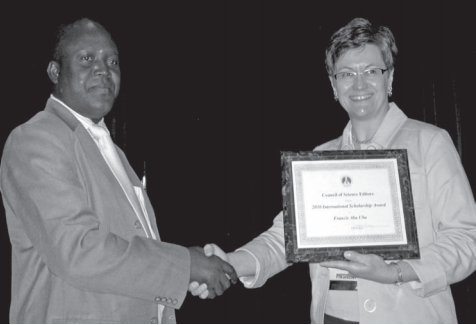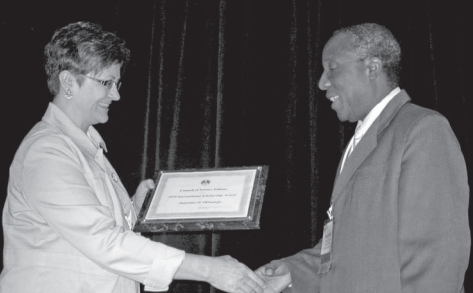The CSE International Scholarship Program provides editors from developing nations the opportunity to attend the CSE annual meeting. Scholarship recipients receive free registration for the conference, reimbursement for travel expenses, the opportunity to network with colleagues, and a chance to share their experiences at a meeting session.
Three editors received scholarships in 2010: Francis Aba Uba (Nigeria), Augustine Ohisamaiye Okhamafe (Nigeria), and A K M Azharul Islam (Bangladesh). Unfortunately, Islam was unable to attend the meeting because of health issues.
When I was told that I would be writing about this year’s award recipients, the writer in me was a bit intimidated by the responsibility but at the same time excited at the thought of conveying some of the experiences of these outstanding scholars. The three scholars shared insights into their journeys toward becoming editors, challenges and accomplishments, how they benefited from the meeting, and possible ways of implementing what they learned in their various journals.
Francis Aba Uba

Editors are drawn into science editing for various reasons—some because of their love for clarity, conciseness, and correctness and some for the flexible job hours. For Francis Aba Uba, becoming an editor was born of necessity and curiosity. Uba, a pediatric surgeon at the Jos University Teaching Hospital in Nigeria, is the founding editor and editor-in-chief of the African Journal of Pediatric Surgery (AJPS). AJPS, an English-language journal, was first published in 2004, then biannually. The journal is now published three times a year, and received about 166 submissions in 2009. Uba explained that he was motivated by the “need to share quality evidence-based information”. Even though he had no editing experience or training, he set out to bridge the gap between pediatric surgeons and highquality information on pediatric surgery in Africa. He had served as a reviewer for some Nigerian and other African journals, and he used this exposure and experience to establish AJPS, which publishes articles on new and relevant discoveries in pediatric surgery in Africa and in the world.
Uba said that there are few pediatric surgeons in Africa, so there was a pressing need for a medium that promotes research, refreshes their knowledge, and exposes them (and even general surgeons who might see pediatric patients) to new information and new techniques. AJPS is financed largely by Uba’s personal funds. In his presentation titled “A 7-Year Editorial Experience with the African Journal of Pediatric Surgery”, Uba mentioned that because of shrinking resources, a fee was attached to article submissions. The fee, he said, caused a substantial drop in submissions, and he has yet to decide whether the fee should be retained. Uba identified three main challenges facing the journal: lack of funds for sustaining publishing and raising visibility; lack of research culture caused by poor and inadequate infrastructure, persistent power outages, and poor Internet access; and lack of office space, staff, and computers.
Aside from his job as the editor of AJPS, Uba is a member of numerous professional organizations, including the Pan African Pediatric Surgical Association (PAPSA) and the World Association of Medical Editors (WAME). He has published about 59 journal articles and two books. Uba serves as a peer reviewer for several journals, including the Nigerian Journal of Clinical Practice and the Journal of the National Medical Association. Uba’s thirst for excellence is demonstrated by the success of the AJPS and a commendation in 2004 for the first successful separation of a set of conjoined twins at the Jos University Teaching Hospital. In recognition of Uba’s efforts in pediatric surgery, he was awarded a fellowship by the British Association of Paediatric Surgeons in 2006.
Uba’s vision for AJPS is for the journal to be ranked on a par with the other leading journals in pediatric surgery worldwide. His target for the journal in the coming year is to increase the contributor and reviewer base. With more articles to choose from and more reviewers to assess submitted articles, he hopes that there will be a substantial increase in the credibility of articles published in the journal.
Uba described his attending the meeting as a “rare privilege, and one I am indeed grateful for”. In my conversation with Uba, he mentioned that the conference afforded him the opportunity to interact with colleagues from both developed and developing countries. In addition, some of the exhibitors might be helpful in improving his journal to the standard required by international indexing bodies. When I asked him what he learned from the conference, he answered enthusiastically, listing many things he gained from both the Short Course for Journal Editors and such sessions as those on journal management, editorial management, personal evaluation using the metric system, and tips on how to manage the editorial board in an effective manner.
After the meeting, Uba said that his first tasks will include putting together an effective editorial board, improving the journal’s Web visibility, applying for indexing in MEDLINE/PubMed, and inviting editorial assistance from colleagues whom he met at the conference. He said that, with the assistance of a functional editorial board, he will be able to reduce the high article acceptance rate. That, he believes, will improve the credibility of the journal and attract researchers from Europe and North America and, in the process, improve the journal’s impact factor.
Augustine Ohisamaiye Okhamafe

Augustine Okhamafe holds a PhD in pharmaceutical technology from the University of Bradford School of Pharmacy in the United Kingdom. He is a professor of pharmaceutical technology at the University of Benin, Nigeria. Okhamafe combines being the editor-in-chief of the Tropical Journal of Pharmaceutical Research (TJPR) with teaching and research. One of his major award-winning research projects was developing a technique to generate low-cost pharmaceutical-grade cellulose from agricultural wastes, such as rice husks, groundnut shells, and maize cobs. The dearth of well-established Nigerian and other African journals in the pharmaceutical sciences spurred his interest in establishing a journal.
Okhamafe tried to start the journal in print form in 1997 and 1998, but because of insufficient resources, his plan did not come to fruition. In 2001, the University of Benin provided its departments with Internet access. Knowing the benefits of the Internet, he and a colleague, Patrick Erah (the editor), seized the opportunity, and TJPR was established with personal funds and with Internet access provided by the university. The journal, then published twice a year, appeared both in print and online. At present, the journal publishes every 2 months and contains at least 12 articles per issue. Access to abstracts and full text is available on the journal’s Web site and through some indexing agencies, such as African Journals Online and Bioline. The print copy is usually printed on demand.
Okhamafe explained that the driving force behind establishing the journal was the lack of access to papers in journals published in developed countries and the global divide in research. He explained that research in developed countries is often not relevant to problems in developing countries. Also, research on issues peculiar to the tropics rarely gets attention from journal editors in developed countries. Hence, the need for a scholarly, peer-reviewed journal that would give adequate attention to research articles from developing countries, especially the tropics.
TJPR is financed mainly through the charges attached to manuscripts accepted for publication and personal funds from Okhamafe and Erah. Okhamafe identified the challenges facing journal publishing in developing countries as “limited resources and the high publication costs”, low readership of academic publications, lack of interest in journals published in developing countries by researchers in developed countries, high distribution costs, and poor communication infrastructure. Okhamafe added that lack of funds, lack of a paid staff (everyone involved in publishing TJPR is a volunteer), and lack of an office are the major challenges facing TJPR.
When asked what he took away from the annual meeting, Okhamafe noted that the Short Course for Journal Editors was very helpful. He said he learned ways to increase his journal ranking; the journal is in the process of determining its impact factor. The conference has also exposed him to ways of collaborating with other journals at the University of Benin. He added that TJPR has been approved for indexing by MEDLINE/ PubMed but that providing the required XML format has been a challenge. However, via interaction with one of the exhibitors at the annual meeting, he hopes to explore the feasibility of outsourcing the production of the XML files to the firm.
Okhamafe said that one of the first things he would do when he returned home is share the experience and knowledge he had gained with other journal editors at his university. His hope for the next year is for the journal to achieve full indexing in MEDLINE/PubMed so that it would be read and used by more researchers in the developed world; that would lead to increased citations of articles published and to a higher quality of articles accepted for publication. As a result of attending the conference and with funding from a Nigerian government agency, he hopes that in the next 5 years, the journal will have enough resources to produce a regular print version.
Okhamafe expressed his profound gratitude to CSE for the scholarship to attend and participate in the annual meeting.
A K M Azharul Islam
Islam is a professor of physics who leads a research group in condensed-matter physics and doubles as editor-in-chief of the Journal of Scientific Research (JSR) published by the Rajshahi University Faculty of Science, Bangladesh.
Islam was unable to attend the CSE annual meeting because of health issues, but he granted an e-mail interview.
Like most journals in developing countries, JSR was established to provide a medium for researchers in Bangladesh to publish their work. At a faculty meeting in 2008, Islam was unanimously nominated as the editor-in-chief and given the responsibility of developing the journal.
JSR is interdisciplinary and organized into two sections: physical and mathematical sciences and chemical and biological sciences. That diversity addresses the various needs of academics in Bangladesh. JSR was started with a grant from the Rajshahi University and was first published in January 2009. The journal is published three times a year and is available both in print and online. After the first three issues were published, authors of articles accepted for publication were required to pay a fee to partially defray the cost of printing.
Islam said that JSR has achieved a lot in its first year of publication. It has attracted authors internationally and has a high submission rate. An article in the journal has been used by British authors in a book published by Elsevier. In addition, Islam stated that in the first 6 months of publication, Google Analytics showed that the articles published in JSR have been viewed many times. That, he said, is an indication of high visibility, especially for a new journal. Islam plans to obtain some CSE publications, such as Scientific Style and Format, which will be helpful for authors, especially ones in developing countries. He also hopes that by being a full member of CSE, he will have access to the network of professionals in science editing.
Preparing instructions for authors on the requirements for online submission and making sure that JSR is indexed by major indexing bodies are two of Islam’s main goals for the coming year. He expressed his appreciation to BanglaJOL for hosting the journal’s Web site and to the International Network for the Availability of Scientific Publications and its project AuthorAID for their mentoring and support in improving the quality of the journal.
